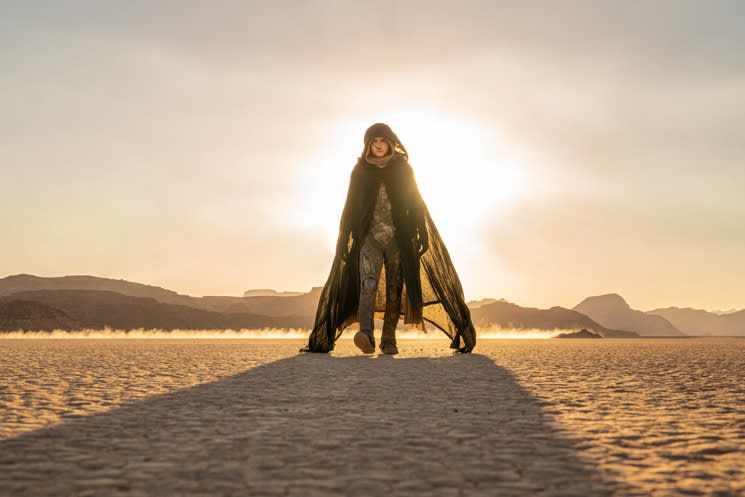The success of Dune: Part One in 2021 can be, at least in part, attributed to the fact that a sequel was, more likely than not, imminent. Unlike David Lynch’s attempt in 1984 to adapt the unadaptable, French-Canadian director Denis Villeneuve was given the not-so-secret key to the puzzle: time.
By stretching Frank Herbert’s "unfilmable" landmark science-fiction novel across two 160-minute films, Villeneuve was able to establish the various worlds of Dune, the different royal houses and their dynamics, and the varying cultures and their histories before diving into the thick of it. As a result, Part One ended on a wanting note, like having the prologue to a novel without the rest of the book to read. With Part Two, the real fun of Dune begins.
The movie picks up right after the events of Part One, as Paul Atreides (Timothée Chalamet) and his mother, Lady Jessica (Rebecca Ferguson), ingratiate themselves with the ways of the Fremen people. As Paul slowly wins the trust of the Fremen, Stilgar (Javier Bardem) becomes convinced that Paul is the messiah as written in the prophecy.
The focus of Paul's messiah status is divided between those who believe and those who consider the prophecy to be propoganda to control the Fremen people, with Stilgar falling in the former camp and Chani (Zendaya) in the latter. Villeneuve and co-writer Jon Spaihts do well to update Paul's storyline, giving consideration to colonization and saviour themes rather than the more commonplace class warfare discourse.
Part Two goes deeper into the House of Harkonnen with another of the Baron's (Stellan Skarsgård) nephews introduced when Dave Bautista's Glossu Rabban fails at securing the north of Arrakis. As the sociopathic other nephew, Feyd-Rautha, Austin Butler excels. By lending the character just the right amount of cleverness and menace, Butler's Feyd-Rautha brings an unsettling yet contained chaos to the film.
Along with Butler, the new generation of Hollywood is well represented. Chalamet continues his run as heir to the prestige-leading-man throne with a dynamic performance as a young man growing into a leader. From Part One to Two, Chalamet gently transforms Paul and presents his inner conflict as a reluctant messiah carefully and thoughtfully. And although Florence Pugh's Princess Irulan plays a small role in this film, Pugh's gravitas hints towards her character's importance if/when a Part Three gets the greenlight.
The efforts of Villeneuve and casting director Francine Maisler in selecting the younger actors needs to be acknowledged. While the likes of Chalamet, Zendaya, Pugh, Butler and Anya Taylor-Joy may seem like obvious choices given their popularity among both Gen Z and older audiences, by grouping these performers together, we get a glimpse of who will most likely be dominating the best Hollywood has to offer in coming years. As they continue to develop as actors, Dune: Part Two will be remembered as the time when lightning struck and, somehow, all of them graced the same screen all at once.
That being said, Dune remains the Denis Villeneuve show.
Shot entirely using IMAX cameras (and for the record, IMAX truly is by far the best way to watch this film), the immense scope of Part Two utilizes the format perfectly. Villeneuve and director of photography Greig Fraser use the vast aspect ratio to capture the grandeur of Arrakis's desert landscape and the House of Harkonnen's population on Giedi Prime.
It isn't only the expanse of the visuals that impresses — it's Villeneuve and Fraser's use of relative sizes that creates an awe-inspiring effect. By placing a person in front of machinery that could be described as a tank, the actual size of the armoured vehicle becomes apparent — something not of our world, something far more powerful than we can comprehend.
Many Canadian cinephiles continue to associate Villeneuve with his earlier homegrown work like Polytechnique, Maelström and, of course, Incendies — films that placed priority on narrative above visuals or scale. Since joining Hollywood's golden circle after 2013's Prisoners, Villeneuve has deservedly commanded higher budgets, allowing him to achieve feats in filmmaking simply not possible within the Canadian industry. However, rather impressively, in spite of the financial abundance before him, Villeneuve has continued to find the heart in each of his films.
This characteristic of Villeneuve becomes all the more remarkable in the face of something like Dune. We've seen other space operas (that borrowed much from Herbert's classic) lose their way amidst the lure of CGI; but with Villeneuve, his north compass steadily maintains its position, facing toward Paul's turmoil, Jessica's ambition, Chani's integrity, Gurney's honour and Stilgar's faith. In a film that could have rested on being a visual masterpiece, Villeneuve stays true to the humanity of his direction.
